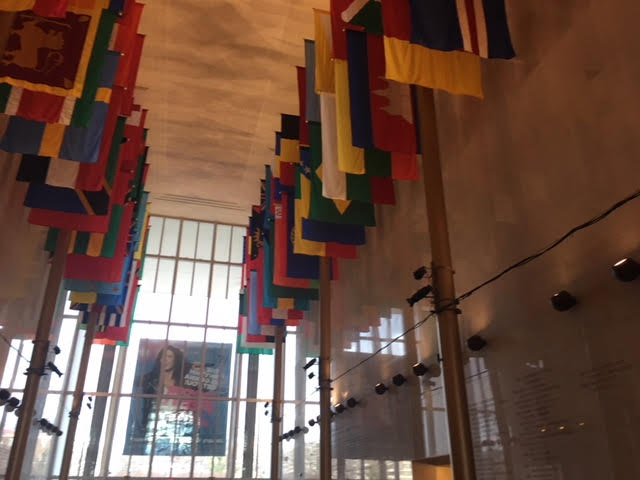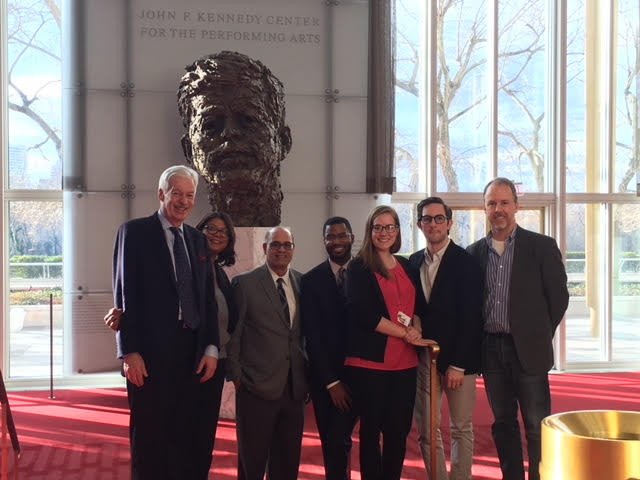Better Than Most is a regular feature of The Business of Giving, examining the best places to work among social good businesses and nonprofit organizations.
Denver: For this evening, Better Than Most, you’ll be visiting one of the most spectacular places that we had been. It is the Kennedy Center for the Performing Arts in Washington DC. We’ll begin with the CEO of the Kennedy Center, Deborah Rutter and then hear from other members of the Kennedy Center staff.
Deborah: And my goal has been for us to be a much more horizontal organization where we work collaboratively across all of the art forms and across all of our areas of expertise. We do so with a sense of pride and responsibility and ultimately, a commitment to our artists and our audiences. Respect is probably the most important value that we hold for one another, and I think that trickles down from JFK himself. Literally, for those of you who have never been to The Kennedy Center, there is an enormous bust that sits watching all of us in the grand foyer at The Kennedy Center, and so a day doesn’t pass where we don’t all experience JFK watching over us.
 Kevin: Deborah showed up, and one of the first things she said is, “What in the world? Why in the world are you guys all segmented like this? We’re not going to have this.” So, she put us all in one large department which is really funny because I’m an old timer. I’ve been here for about 23 years, and for those of us who have been here that length of time, we know that’s how we use to operate but then over time, things became more segmented and more segmented. We worked in these isolated areas. Well, she came and said “Oh my God, this is crazy. Let’s put you all back together.”
Kevin: Deborah showed up, and one of the first things she said is, “What in the world? Why in the world are you guys all segmented like this? We’re not going to have this.” So, she put us all in one large department which is really funny because I’m an old timer. I’ve been here for about 23 years, and for those of us who have been here that length of time, we know that’s how we use to operate but then over time, things became more segmented and more segmented. We worked in these isolated areas. Well, she came and said “Oh my God, this is crazy. Let’s put you all back together.”
Now, we have a newly reconstituted programming department which has allowed all of the programmers to do a blended, multidisciplinary approach to the programming that we present at The Kennedy Center which has been so terrific. It really speaks to what we can offer uniquely as the Kennedy Center.
Jeanette: In the past, I would say that education was absolutely siloed and seen as something that primarily focuses on kindergarten through grade 12. What do we do in schools? How do we support that type of programming? But education has taken on a brand new meaning in the last few years particularly looking at a lifetime of learning. Being much more thoughtful about what that means. What are the opportunities to connect to the art to be able to make the education and arts education part of a meaningful lifetime?
John: You get to hear these fabulous stories of how people want to expand the arts and the community, and what their moonshots are and how they’re going to strive to do better. It’s just one of those things. It’s never a dull moment. You’re always getting to experience something new and interact with the community and see how they want The Kennedy Center to play a role not only in their community but also in the nation, and hopefully, as we work every day in the world.
Derek: We don’t just book things that are guaranteed to be sell-out performances. We know that we stand for more than that. So much so that many of us, if you’ll notice actually carry around the mission vision and values of The Kennedy Center with our IDs. I think that’s been really interesting because I think a lot of organizations go through these long processes of figuring out what the values are. Then they shove them aside, never to look at them again. We have that daily reminder on our ID badges. We have staff meetings and we have employee recognition. When we’re calling out an employee who has done something well, we’re talking about what value of The Kennedy Center that employee’s exemplifying.
Lauren: We are all a part of pods which are small groups that have education and marketing and public relations presence as well as production and programming and development. Together we get the ideas flowing, and we’re able to think critically about what we’re trying to do when engaging the public and how to get more people involved with The Kennedy Center.
Carlos: Usually, Facilities Management is behind the scene. You are in the dungeons. You make sure everything is running and you are not seen. I struggled with that for a while, and it was not until The Kennedy Center leadership started placing the emphasis on guest experience and client satisfaction that I was able to make the connection between the mission and clients and facilities. For example, what is experience the patrons will go through when coming into The Kennedy Center.
Kevin: Several weeks or months go by, and the show or event happens. After it’s finished, we make a point to have what we’re calling a wash up which is really a post-event evaluation and reflection upon what happened. That is something that we need to do because there are so many people involved. We have a myriad of different departments, and we are so large, sometimes the bureaucracy has impeded our progress to be able to make improvement. This new creative brief followed by the post-event washup has allowed us to look long term to think how, what infrastructure, what processes, what systems that we might be able to improve upon to make a long-term change among the culture of the organization.
Jeanette: It’s been really exciting to be a part of something that allows me personally to grow as a member of the institution, to have curiosities and to be rewarded for those curiosities and to have new opportunities. Most importantly, to also be able to mentor and identify new people who may be really wonderful assets to the institute. No only growing yourself but having the opportunity to help be a part of someone else’s growth is such a tremendous thing.
John: From the moment they go get their parking ticket and they park their car to the moment they walk out of that car, go up that escalator, and in to that theater and see that performance, and then walk right back out. It’s having that commitment to having this unforgettable experience that you will take with you for the rest of your life.
Derek: Aside from the amazing artists we get to see and going to many performances and being backstage at photoshoots, things of that nature, you’re just surrounded by some of the most brilliant art administrators in the field. There’s this type of – this feeling that you get. It’s not tangible but this amazing feeling when you are in a room with these groups of people who are creating that you see onstage but beyond that, trying to figure out how to share that beyond the walls of The Kennedy Center. How we can we get as many people to experience this art that we see on a daily basis? It’s really quite exhilarating.
Lauren: One of the things that I am most proud by working here is we offer a free performance daily on the Millennium Stage, so this everyday at 6PM. If you’re not physically able to be in the building, you can actually watch this through our live stream on Facebook and YouTube. It’s a wonderful opportunity for those who may not be able to experience the arts within our building to be able to view in and see all the different sorts of genre that we have to present.
Carlos: One of the benefits of working at The Kennedy Center is that you are allowed the opportunity to witness and participate on multiple special events and signature events like honors and Mark Twain Prize and so on. What I like about it is that even though I’m part of that event, I’m the facilities guy in disguise but then I become the ambassador to the president of The Kennedy Center because the message from the president of The Kennedy Center is make sure every person, every patron, every visitor feels welcome.
Michelle: When the opportunity to come back to The Kennedy Center came up again, I said, I need to take another look. Something is different. It turns out that things have changed quite a bit here. I think many of my colleagues have touched upon aspects of institutional change. What I will say is that there is a warmth here that is I think new and very representative of the kind of cultural change that has started at the top with Deborah’s leadership absolutely. There was always an entrepreneurial spirit at The Kennedy Center. We’ve always put on a tremendous number of performances but now there is a humanity to our day to day that I know a lot of us find very energizing.

Denver: I want to extend my thanks to all those who participated in this piece: Michelle Pandoli, Kevin Struthers, Jeanette McCune., John Guistello, Lauren Holland, Derek Johnson and Carlos Elias. To hear this again, read the transcript or see pictures of the participants in the Kennedy Center itself, come to denver-frederick.com and we’ll have a link there to my interview with Deborah Rutter, the Chief Executive Officer of the Kennedy Center for the Performing Arts.
The Business of Giving can be heard every Sunday evening between 6:00 p.m. and 7:00 p.m. Eastern on AM 970 The Answer in New York and on iHeartRadio. You can follow us @bizofgive on Twitter, @bizofgive on Instagram and at http://www.facebook.com/BusinessOfGiving

